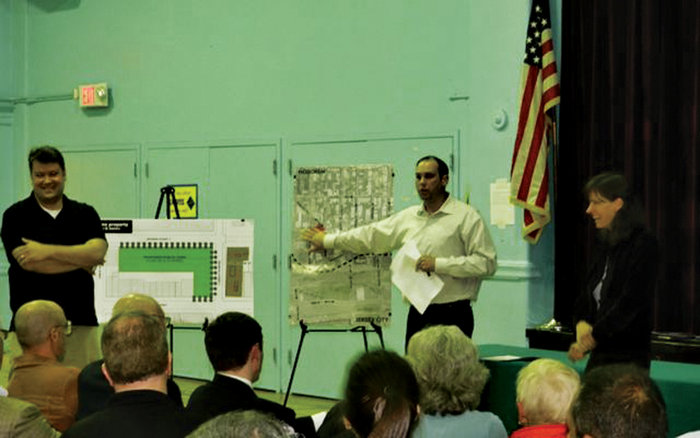Passion and politics collided Monday night, April 8, when Hoboken residents met with Mayor Dawn Zimmer and City Council members to discuss the future of park space acquisition in Hoboken.
In the gymnasium of the Connors School, the mayor and city officials worked to convince about 30 local residents that progress is being made on the city’s plan to add parks, and in a timely manner.
In 2011, the City Council unanimously voted to approve a $20 million parks acquisition bond ordinance in order to acquire open space for the city. Three park locations are currently under consideration in southwest Hoboken, but progress has been slowed by negotiations and legal wrangling, to the dissatisfaction of many area residents.
The public meeting answered questions for some, but others said they felt that not enough was being done.
Those in attendance came armed with questions regarding traffic patterns surrounding the parks, student access to facilities, Jersey City residents’ use of the parks, and costs to maintain the parks. Some were disappointed in the answers they got, but others recognized that the parks plan is still in its early phases.
Resident Jim Kocis, who said he’s been interested for 20 years in adding new parks, said the project is about the future.
“This is about the children of the children of the people who are here tonight,” he said.
Crisis on the way?
Leah Healy, co-founder of the Hoboken Parks Organization, expressed concern that Hoboken will soon be facing an open space crisis.
“As Hoboken continues to grow, we will need more open space acreage,” Healy said to Mayor Zimmer. “Do you have the stomach for this?”
The timeline for the completion of the open space project has become a hot button issue as litigation continues to slow the process. Fourth Ward Councilman Tim Occhipinti, a frequent critic of the mayor, said he felt that progress so far has been too slow. He lamented the fact that the status of the parks has been the same for several years.
“I have heard frustration from many community members who are not satisfied with the progress,” he said.
Occhipinti said the three Zaklama properties at First and Jackson Streets are a possibility for a future park.
“In order to get the best park possible we must use all of the tools at our disposal.” – Mayor Dawn Zimmer
____________
Three parks
One six-acre park is set to begin at Block 12, a triangular section of land bordered by Harrison Street, Jackson Street, Observer Highway, and Paterson Avenue. It could serve as a potential cornerstone to a larger southwest park.
Zimmer has referred to this park as an anchor and touted it as the first phase of a massive overhaul of the area. The owner of this property reportedly is motivated to sell, but believes the property is worth more than its current zoning suggests. Unable to agree on a price, the city is undertaking eminent domain proceedings to determine the land’s fair market value.
Additional park space has also been proposed at Madison and Eleventh streets. The property’s current owner, BASF, is in ongoing negotiation with the city over the sale of the property.
Currently in the very early stages of development, a one-acre site at Seventh and Jackson streets in central western Hoboken has been slated to become a public park. Zimmer said she is confident the Pino Site, a former tow yard, will be owned by the city within the year.
The mayor remains committed
Zimmer, herself a 4th Ward resident and a longtime advocate for parks in the southwest, was unable to give a completion date for the park projects on Monday, due to the unpredictability of the court system. In an open letter to her constituents, Zimmer was able to give a timeline on certain aspects of the projects.
She said construction is planned to start on the Block 12 site, one of three planned locations, in 2014.
“In order to get the best park possible we must use all of the tools at our disposal,” she said. “I’ve demonstrated that I’m not afraid to use eminent domain,” in which government condemns property needed for public use and pays fair market value for its acquisition.
She stressed the need for “balanced development” moving forward, despite political pressure to put a deadline on the project.
Occhipinti would like to see more pressure on the mayor to expedite the process. “I’m very frustrated, and I think our residents have a right to be frustrated,” he said.
Councilman David Mello, a Zimmer ally, echoed the mayor’s hope that politics would not get in the way of having as much park space as possible for the city. He pointed out infrastructure issues such as traffic and drainage that have to be overcome before a park project can be successfully completed.
Residents in neighboring Jersey City Heights would likely share in the enjoyment of new parks in Hoboken, according to Mello.
“There is a tremendous amount of new development in Jersey City,” said Mello. “If Jersey City infrastructure doesn’t step up there will be a burden placed on the taxpayer.”
Latest chapter in a long story
The acquisition of land in southwest Hoboken marks a continuation of the grassroots fight to keep Hoboken green. A 1985 bid for waterfront offices by the Port Authority of New York and New Jersey was halted by People Advocating Sane Solutions, a legally represented group leading the fight against the authority’s planned development on the river. Eventually, piers A and C in Hoboken became parkland rather than development.
The ongoing gentrification of Hoboken during the 1980s brought on a boom in the value of waterfront properties, prompting residents to take action.
“My stomach says were in crisis,” said Healy, “we see more than 1,300 people daily at Church Square Park. We need more open space.”
Alex Jackson may be reached at editorial@hudsonreporter.com.
